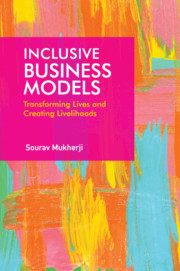Book contents
- Frontmatter
- Dedication
- Contents
- List of Tables
- List of Figures
- Preface
- Acknowledgements
- 1 Introduction
- 2 Vaatsalya Hospitals: Affordable Healthcare in Proximity
- 3 Gyan Shala: Providing Inclusive Education
- 4 Rang De: Creating a Platform for Social Investing
- 5 Labournet: Empowering Informal Sector Labourers
- 6 Selco: Inclusive Model for Energy Access
- 7 Hasiru Dala Innovations: Improving Lives of Waste Pickers
- 8 Reliance Retail: Creating Inclusive Supply Chain
- 9 International Development Enterprise (Ide) Nepal: Developing Smallholder Ecosystem
- 10 Ruralshores: Delivering Inclusive Service
- 11 Gujarat Narmada Fertilizer Company’s (Gnfc) Neem Initiative: A Social Business
- 12 Bringing it All Together
- References
- Index
11 - Gujarat Narmada Fertilizer Company’s (Gnfc) Neem Initiative: A Social Business
Published online by Cambridge University Press: 31 July 2021
- Frontmatter
- Dedication
- Contents
- List of Tables
- List of Figures
- Preface
- Acknowledgements
- 1 Introduction
- 2 Vaatsalya Hospitals: Affordable Healthcare in Proximity
- 3 Gyan Shala: Providing Inclusive Education
- 4 Rang De: Creating a Platform for Social Investing
- 5 Labournet: Empowering Informal Sector Labourers
- 6 Selco: Inclusive Model for Energy Access
- 7 Hasiru Dala Innovations: Improving Lives of Waste Pickers
- 8 Reliance Retail: Creating Inclusive Supply Chain
- 9 International Development Enterprise (Ide) Nepal: Developing Smallholder Ecosystem
- 10 Ruralshores: Delivering Inclusive Service
- 11 Gujarat Narmada Fertilizer Company’s (Gnfc) Neem Initiative: A Social Business
- 12 Bringing it All Together
- References
- Index
Summary
Nobel laureate Muhammad Yunus pioneered the term ‘social business’, defining it as ‘a no-dividend company dedicated to solving human problems’ (Yunus 2017). Conceptually, social businesses are very similar to inclusive business models that we have described so far in the book. However, the examples given by Dr Yunus are about social businesses that are incubated as ventures within or by for-profit enterprises, such as Grameen Danone created by Groupe Danone of France. Thus, these inclusive businesses are created in a unique context, where being conceived by a commercial entity results in some advantages as well as some new challenges for them. In this chapter, we will talk about one such initiative undertaken by the Gujarat Narmada Fertilizer Company (GNFC).
GNFC is one of the large chemical and fertilizer companies in India, with a turnover of INR 61 billion in the 2017–18 financial year. GNFC was established in 1976 with the primary purpose of manufacturing urea and nitrogenous fertilizers. By 2017–18, though it had diversified into energy and information technology, 90 per cent of its revenue and profits came from fertilizer and chemicals, with urea being one of its most important products. In India, urea is a government-subsidized commodity, meant to be used by farmers as an essential fertilizer in agriculture. However, significant quantities of subsidized urea used to be diverted from farming for use in chemical factories as low-cost input, often resulting in shortage of urea for agriculture.
A few years ago, a report prepared by the Agricultural Development and Rural Transformation Centre, Bengaluru, suggested that coating urea with neem oil would improve soil health and reduce pests and crop disease, thereby decreasing the need to use pesticides. More significantly, it would also make the urea unusable for non-fertilizer applications, and thus prevent diversion (Ramappa and Manjunatha 2017).
Apart from preventing diversion, the coating of urea with neem oil was expected to increase usage efficiency by preventing the evaporation of urea into the atmosphere and its leaching into the soil and water. It was estimated that more than half of the nitrogen present in urea was not assimilated by crops because of various factors, including ammonia volatilization. Neem had properties that reduced losses by slowing down the process of nitrate formation.
- Type
- Chapter
- Information
- Inclusive Business ModelsTransforming Lives and Creating Livelihoods, pp. 267 - 284Publisher: Cambridge University PressPrint publication year: 2021



